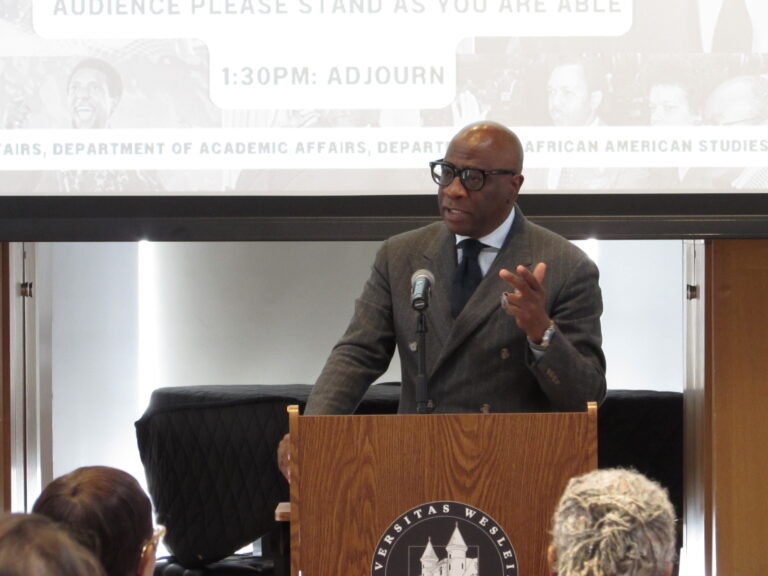Students Push Back Against Proposed Budget Measures at Affordability Meeting
Last Tuesday evening, President Michael Roth conversed with students in an open forum about the affordability of Wesleyan’s tuition, financial priorities, and proposed changes to the University’s need-blind status. Roth was joined by Vice President for Finance and Administration John Meerts and Dean of Admission and Financial Aid Nancy Meislahn and began the forum with a presentation about the University’s budget.
Calling the present financial aid and tuition policy “unsustainable,” Roth suggested several different options the University could take to ameliorate its long-term fiscal outlook.
Over the past five years, the rate of increases to student charges—approximately 5 percent per year—has been nearly two and a half times higher than the Consumer Price Index for the Northeast Region, which is roughly 2.3 percent per year. According to the 2012 US News and World Report, Wesleyan is the eighth most expensive private not-for-profit four year college in the country, at $43,674 a year plus room and board and additional fees.
“I think it becomes unconscionable, in an epoch where real wages of most Americans are not going up, to raise tuitions in excess of inflation,” Roth said. “If we’re going to be 5,000 or 6,000 dollars [in tuition] more than Middlebury or more than Bowdoin or more than Vassar, if that happens over time, I think people are going to reject this price gouging. What they won’t reject, I think, is philanthropy. We are very fortunate. People do give millions of dollars for financial aid.”
Among possible options to cut costs and make Wesleyan more affordable, Roth discussed a three-year B.A. program for students who have difficulty paying tuition for the traditional four years. Although students would graduate a year earlier, Roth stated that they would end up taking the same number of classes, making up for the missing fourth year with summer courses.
Another possibility being considered, Roth said, is a change to the University’s need-blind policy, which would retain need-blind status for approximately 80 to 90 percent of the applicant pool. Roth did not indicate what procedures would determine which applications would lose need-blind status—whether, for example, it should be determined randomly or based on the competitiveness of applications.
During the question and answer session that dominated the hour-long meeting, several students raised concerns about the transparency of the budget, the lack of student involvement in decision making, and whether or not the University should consider selective budget cuts.
In one particularly heated moment, Ben Doernberg ’13 criticized what he deemed a lack of student empowerment to evaluate the University’s priorities.
“In the last couple months we saw there was the issue with the Art Library and the issue with changing the rules for how visiting faculty are compensated,” he said. “And in all those cases it didn’t seem like the community was consulted—the people who it affected found out about it after it had already been decided.”
Doernberg stressed the need for information sharing between the administration and students and said that the budget data currently available is inadequate.
“It seems like the way to prevent things like that from happening again is for students to be able to see what the budget of the school actually looks like,” Doernberg said. “But, frankly, this pie chart [of operating expenses] tells me absolutely nothing.”
Vice President for Finance and Administration John Meerts contended that the University website does offer substantial budgetary information.
“The budget is on the website in as much detail as we can give out without betraying personal information,” he said.
Discussions centered around how budgetary decisions should be made and how the value of particular programs should be evaluated. Roth said that making decisions about spending in a democratic manner may be problematic because of differing priorities.
“I do worry—maybe I’m wrong to worry—but when we have a meeting where somebody’s going to say we shouldn’t be spending so much money on whatever your least favorite part of Wesleyan is—whatever you don’t think should be our priority,” said Roth, “I do worry about the impact on the community of that kind of ‘We’re going to get rid of this or that because it’s not really Wesleyan.’”
After expressing his concerns about engaging in these debates, Roth expressed a willingness to receive input from the student body.
“I’m nervous [about having that kind of conversation], but if that’s what people want to do, we can have those conversations,” he said.
Julian Applebaum ’13 agreed with Roth’s apprehensions about allowing students to evaluate budgetary expenditures.
“I bet there are students who could take a non-biased viewpoint towards the budget and actually try and do what’s best for the school,” Applebaum said. “But I think a lot of the students here would just be trying to cut things they don’t like to benefit their [own] department, and in that sense I don’t trust the student body with having so much power over the budget.”
After the meeting, Doernberg said that he felt like some fundamental questions had been left unanswered.
“Wesleyan didn’t accept students of color, and then at some point they did,” he said. “Who makes that decision? Who makes the decisions about the core nature of the school?”







I know an easy way to save a couple hundred thousand dollars. How about Roth who already has his food, children’s education, travel and housing payed for by the school take a pay cut out of his massive salary instead of cutting our financial aid. He could do what many CEO’s and presidents have done before him and work a few years for $1 salary. It would have little to no impact on his actual lifestyle (as he has no expenses and is already very wealthy) and would put 500k+ back into the school.
And to answer Roth’s question about what my least favorite part of Wesleyan is.. its him….
Roth actually only makes a little north of $300k… that $500,000 figure that people keep citing was a onetime thing related to his hiring. Also, it’s called market price. Roth’s salary is pretty much the lowest in the NESCAC (yes, his salary is lower than the presidents of even Bates, Trinity, Colby, Hamilton, etc.). $350k is the going rate for selective liberal arts college presidents. Deal with it.
What has Roth done that’s so bad? Financial aid isn’t being cut. Roth has done a lot of fundraising, and most of it is directed towards financial aid. It isn’t his fault our endowment sucks and Wes can’t offer more aid. Get your parents to donate to the endowment – that’s the best way to increase financial aid long term. The next capital campaign is raising $200 million for financial aid, all being poured into the endowment so that it will grow. They increased the financial aid budget for next year by, what, 11% over last year? Where’s it being cut?
Dr. Roth is a good man, and a very good college president, in my opinion. He more than earns every one of his $300,000 per year in salary, and is a real credit to Wesleyan.
That said, I’ll bet President Roth would actually consider the $1 a year idea, if only for a single year, perhaps, as a gesture of personal sacrifice toward a critical common goal.
That leader is best who leads by example. I know Dr. Roth understands this. No doubt he and his family would miss a year’s salary … but they wouldn’t miss it a great deal, as has been pointed out above.
The impact of such a personal decision on Dr. Roth’s part, to make this personal financial sacrifice, could have a HUGE positive effect on Wesleyan in many ways.
The extra $300,000 would help … but MUCH more significant would be the example it would set for potential donors and the pride it would instill in the Wesleyan student body and faculty:
—
“Dr. Roth gave up a year’s salary to strengthen Wesleyan and rebuild its endowment. What can you contribute?
“Our president sacrificed his salary to help us. What’s YOUR president done for YOUR college, lately?”
“If Dr. Roth can give up his salary for a year, what can I do in my studies, my social life, my extra-curriculars as a Wesleyan student to honor this great university which I’ve been privileged to join?
—
In all likelihood, the world economy has hard times looming ahead. Wesleyan is wise to get out in front of the coming downturn, and take large, proactive steps to buttress it’s financial position.
Dr. Roth … show us the way by putting your own money where your mouth is!
NOTHING would be so powerful or useful in the fundraising effort in which you’re engaged. Nothing would show the true character of Wesleyan University, the altruistic/giving spirit of service and contribution that has always made Wesleyan unique among it’s peers, better than this act of principled commitment and leadership that only YOU can perform. And nothing would set a better example for students, college administrators, and citizens all across the nation at this critical time of widespread fear, financial insecurity, and loss of opportunity.
I’ll bet you could potentially double your capital campaign target from $200 million to $400 million — or even more — on the strength of this one act alone.
And what a lesson you would teach to every single Wesleyan student, faculty, and alum!
In the final analysis, wouldn’t the lesson learned from your example be worth even more to the university, to the nation’s higher eduction community, and to the world at large than the extra hundres of millions of dollars you might generate for Wes’s endowment?
I dare say it would.
Thank you, Dr. Roth, for leadership, for your love of Wesleyan University, and for your commitment to making ours a better world.
Respectfully,
A proud Wesleyan parent
Roth is not overpaid given what the market is paying for people with his skills. The question is whether we are getting enough for the salary. Wesleyan faces a real challenge to its long term financial viability. It’s not all in Roth’s power to change but he’s the centerpiece. The school needs two big adjustments: (1) get a better handle on costs and (2) rebuild the endowment, which needs major donors to get back to competitive levels. He’s doing ok on item one, though nothing off the charts. On item two Wesleyan is still marking time. The pre Roth era leaders squandered a competitive advantage, and then lost even competitive equality financially. It’s a huge rebuild and I see no evidence that Roth is getting it done.